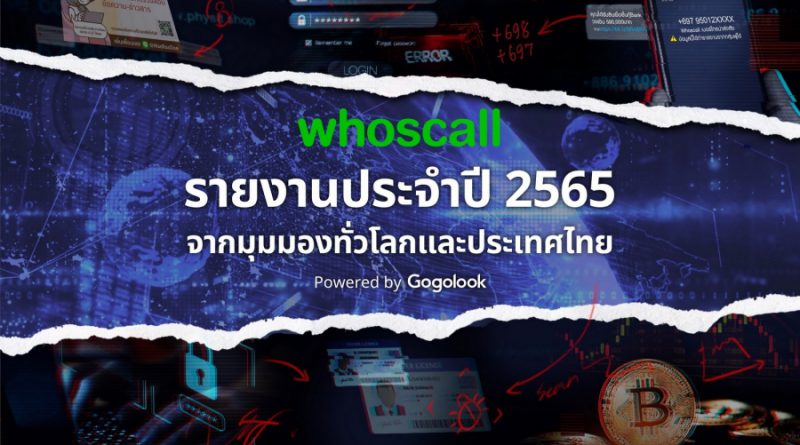Whoscall Thailand Annual Report 2022 reveals 165% increase in scam calls and over 13 million Thai mobile numbers leaked
- Scam attempts jump to 17 million during year with 7 in 10 messages Thai received are either scam or spam
- Revealed for the first time, up to 45% of Thai phone numbers have been leaked
Bangkok, Thailand –April 4, 2023: Whoscall, the anti-fraud caller ID mobile application that offers caller identification services for smartphone users, highlights the growing problem of scam calls and messages in its annual report by revealing it identified 405.4 million scam calls and messages around the world during 2022. Even though scam calls decreased compared to the previous year, it remains a significant issue as scam calls in Thailand increased by 165% resulting in 17 million scam calls in 2022. The report also reveals that the details of 45% of all Thai mobile numbers –13.5 million numbers, were leaked during the year. The issue highlights the continuing spread of scams and security issues around the world.

Manwoo Joo, Gogolook’s Chief Operating Officer said “The growing threat of fraudulent activities, and their impact on the anti-fraud industry. According to Fortune Business Insight, the industry is projected to reach US$129.2 billion by 2029, reflecting a 22.8% compound annual growth rate. With the rise of generative AI and vulnerabilities in enterprise digital transformation, fraudulent technologies and their consequences are expected to intensify in the future. To combat the growing threat of fraudulent activities, we at Gogolook are partnering with several strategic partners in Thailand and around the world. Together, we are developing innovative solutions to tackle these threats and protect our customers from malicious attacks. Our collaborative efforts aim to provide comprehensive anti-fraud protection and ensure the safety and security of Whoscall users.”

Titinun Suttinaraphan, Gogolook’s SEA Regional Marketing Director, has sounded the alarm on the pervasive problem of fraudulent activities and the need for effective anti-fraud measures. Titinun highlighted the shocking statistics that more than seven in 10 – 73% (324 million) of all SMS messages received by Thai citizens are spam or fraudulent. Scam phone calls increased by 165% from 6.4 million in 2021 to 17 million in 2022. As these threats continue to grow in scale, Gogolook is committed to raising awareness among the Thai community about the importance of anti-fraud protection.

Scammers prioritize text messages due to high penetration rates at low cost and SMS messages are used as a tool to ‘First Contact’ potential victims and trick people into clicking phishing links to steal information. The most common topics used in scam messages are offering loans – often claiming to be from the government or bank – and giving access to gambling sites – which are illegal in Thailand. Scammers attempt to entice phone users into clicking phishing links or adding a LINE account to help them carry out their fraud by posting messages like ‘you’ve won an award’, ‘your bank loan is ready’, and ‘your government support is approved’.”

Frauds are localized for different countries with unique formats and hotspots depending on local conditions. Based on fraud search and identification (calls and messages included) per capita among Whoscall users, Thailand tops the list with an average of 33.2 calls and messages checks each year. This compares to 17.5 checks in Taiwan (down 20%) and 16.5 checks in Malaysia (up 15%). This figure underlines the widespread nature of scams across many countries.
Emerging scams in Thailand closely follow current issues and trends in the country, and now phishing text messages and calls related to loan, Cost-On-Delivery e-commerce scam, government officials impersonation, fake part-time jobs announcement from TikTok and other well known platforms are increasing.

To fight against fraud effectively, governments have drafted anti-fraud policies, established designated authorities to deal with scams, and mobilized private companies and celebrities to raise public awareness of scams and fraud. In Thailand, there is cooperation between the public sector (The Royal Thai Police, NBTC) and the private sector (Whoscall, mobile network operators, etc.) to raise awareness for fraud prevention.
Private data leaks are often the first step for scammers to access contact details before their attacks. Leaks can happen when enterprise or government databases got cyber attacked, or when users fill out surveys, psychological tests, or forms on phishing sites. To minimize threats from the start, Gogolook, the developer behind Whoscall, collaborates with Constella Intelligence, an international digital risk protection service provider, to analyze phone number leaks in several major markets. Results show that 45% of phone numbers in Thailand are leaked. Login passwords, phone numbers, and names are the most leaked private information followed by nationality, email, address, and birthday.

Each piece of leaked information can lead to a different risk scenario. For example, online banking or social network accounts can be stolen after login passwords are leaked. When scammers access names, phone numbers, and even payment and shopping records, they can easily initiate phone and message attacks. Choosing two-step authentication for online services, changing strong passwords regularly, and identifying phone calls and messages with Whoscall can protect users.
Since online services further popularized under the COVID-19 pandemic, frauds have accelerated across countries in velocity, without any signs of slowing down. Whoscall suggests users follow these guidelines to help prevent fraud:
- Don’t click: If you receive a link in an SMS do not click the link, especially if it appears to be from a bank or an unknown number. Financial institutions in Thailand are not allowed to send links via SMS.
- Don’t fill: If you receive an SMS asking for personal information or request to update username/password or financial information with a link to a suspicious website don’t leave any personal information
- Don’t ignore: Users can help to fight against phone scams and fraud together by reporting suspicious or fraudulent numbers using the Whoscall application to protect and help spread the warning to the community
About Gogolook
Gogolook is a leading TrustTech company established in 2012. With “Build for Trust” as its core value, it aims to create an AI- and data-driven global anti-fraud network as well as Risk Management as a Service. From multi-communication to fintech, SaaS and Web3, Gogolook creates trustworthy empowerment with the use of technology in various fields.
Gogolook has also teamed up with a number of institutes such as the Taiwan National Police Agency Criminal Investigation Bureau, the Financial Supervisory Service of South Korea, Thai Police Cyber Taskforce, Thailand Central Investigation Bureau, the Fukuoka city government, and the Malaysia police and Selangor state government to fight fraud and ultimately, to build a trustworthy communication network with the largest number database in East Asia and Southeast Asia.
About Whoscall
With over 100 million downloads and more than 1.6 billion numbers in its database, Whoscall provides users with unknown number identification, a spam number blacklist, and suspicious message filtering.
The Whoscall team is dedicated to developing fraud prevention technology, utilizing AI technology, and analyzing scam groups. Equipped with this technology, Whoscall is able to display suspicious calls on the screens of users and provide ample warning for malicious calls such as scams, sales, and spam. At the same time, Whoscall is also able to notify users not to miss important calls.
Whoscall can be downloaded free at: https://whoscallthailand.onelink.me/1Ffj/downloadnow




